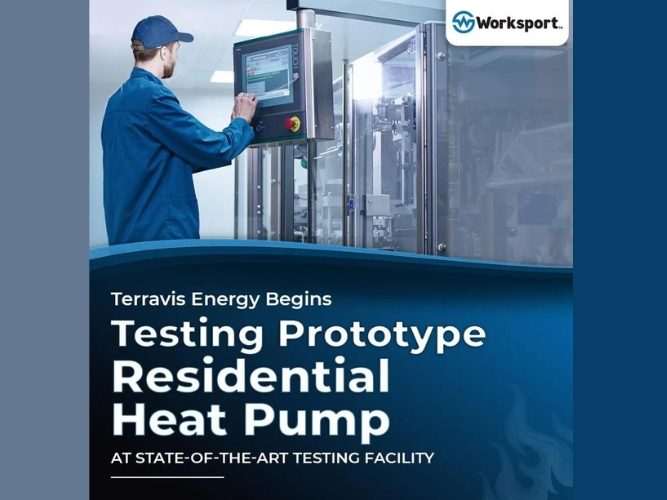Terravis Energy Begins Testing Prototype Residential Heat Pump at State-of-the-Art Testing Facility

Worksport Ltd. is pleased to announce that its subsidiary, Terravis Energy Inc., has refined and completed a working prototype of its Cold Climate, Air Source Residential Heat Pump intended for use in the residential home heating and cooling market, and has begun a testing program in a state-of-the-art climate chamber at Worksport’s Toronto facility.
The company’s testing chamber conducts extensive cold-weather trials during product development. For the Heat Pump, Terravis executes detailed tests that monitor performance across a range of 12 temperature points from 14ºF (-10ºC) to -31ºF (-35ºC). These tests include checking 4 refrigerant pressure zones, airflow, and the energy consumption of each component. The aim is to optimize the heat pump’s efficiency and performance at various temperatures. Additionally, the heat pump’s operation is assessed at multiple set temperatures within this range. Plans are in place to expand the testing to include its cooling capabilities at higher temperatures.
“We are engaged in this rigorous and severe testing protocol because Terravis’s mission is to offer a zero-emission residential Heat Pump that sets new standards in cold-weather performance,” commented Terravis Energy CEO Lorenzo Rossi. “Many heat pumps on the market are inadequate in pushing enough hot air into homes at temperatures under 4ºF (-20ºC), resulting in a failure to maintain indoor comfort levels at low temperatures. Our heat pump’s goal is to provide heat to homes in as low -31ºF (-35ºC), which we believe will make us the most effective heat pump technology in the market.”
An air source heat pump like the one Terravis is testing utilizes the phase change of a proprietary fluid to transfer heat. A heat pump captures existing heat from outside air, amplifies its warmth, and then moves it indoors to heat our home, functioning efficiently even in cold weather because some heat is always present in the air. When cooling, it employs the opposite phase change, from gas to liquid, to move heat from inside the home to outside. Most North American households in colder areas depend on fossil fuel-powered central furnaces with air blown through duct systems. Unfortunately, these costly appliances are one of the largest contributors to carbon emissions worldwide and require significant amounts of energy. To lower emissions, many localities are banning future installation of gas-powered stoves, furnaces, and propane heating. Terravis believes that this move will create a new, large market and effectively will require the use of climate-friendly appliances, such as the Terravis Heat Pump, in new construction residences.
“Terravis’ goal is to create products that help usher in a zero-emission future,” Rossi said. “With the advent of ubiquitous electrification, society is clearly moving away from fossil fuel as an energy source. This must also happen in home heating. We expect that soon residences will be heated and cooled with zero-emission, sustainable clean energy, thanks to heat pumps like the Terravis system, which is expected to be used in cold and hot climates.”
The Terravis Heat Pump, an innovative solution for colder North American climates, is designed not only to operate at lower temperatures, as the testing process is expected to demonstrate, but also to offer an easier-to-install modular design for simpler and flexible placement in homes, permitting different ways of mounting depending on the space needs.
“Worksport is pleased to bring innovation into a global market where it is long overdue,” said Worksport CEO Steven Rossi. “Terravis’ Cold Climate Residential Heat Pump is designed to save on operating costs, energy, and emissions. It is anticipated to enter a very large international market comprising numerous residences wherever there is cold weather and the need for heat. Worksport and its subsidiary Terravis intend to become an all-energy, zero-emission enterprise, enabling clean and sustainable off-grid solutions. With the Heat Pump’s simulated cold climate testing, the Company is very excited to have taken a giant step forward in its move toward this important new market."




